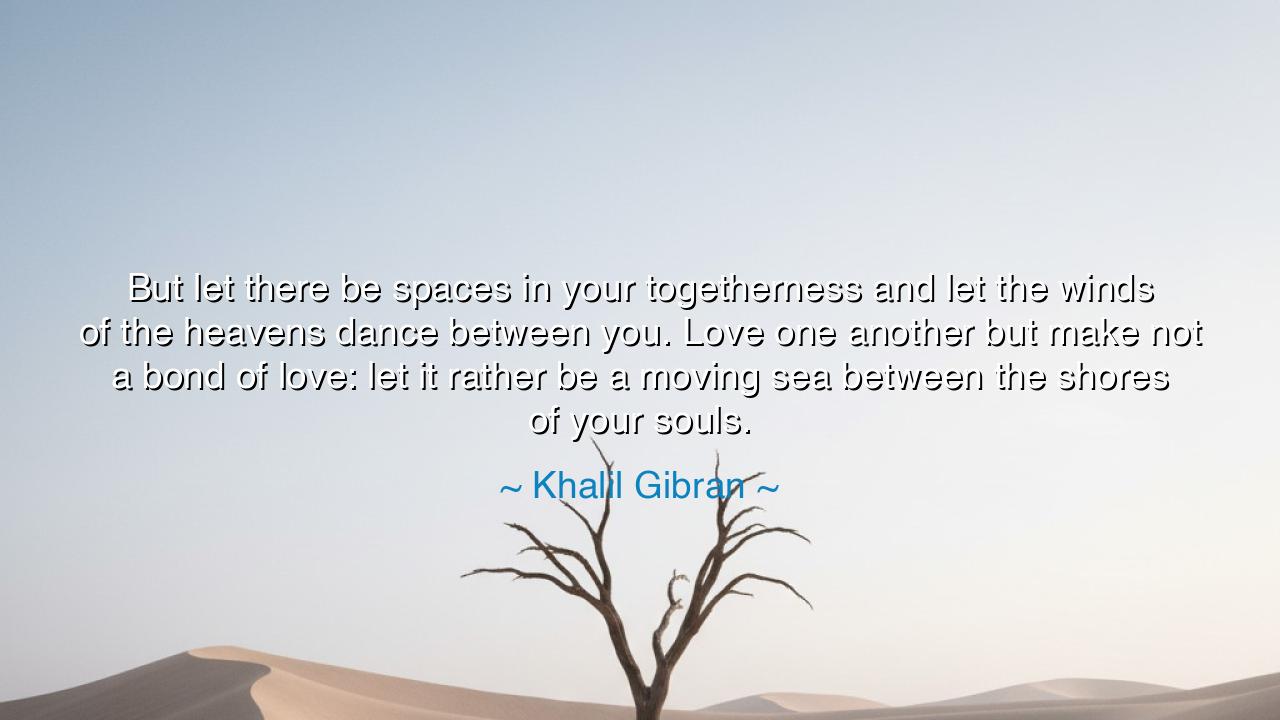
But let there be spaces in your togetherness and let the winds of
But let there be spaces in your togetherness and let the winds of the heavens dance between you. Love one another but make not a bond of love: let it rather be a moving sea between the shores of your souls.






"But let there be spaces in your togetherness and let the winds of the heavens dance between you. Love one another but make not a bond of love: let it rather be a moving sea between the shores of your souls." Thus wrote Khalil Gibran, the poet of Lebanon, the mystic of the modern age, whose words bridge East and West like the rising of the dawn. In this passage, drawn from his timeless work The Prophet, he speaks of love not as a possession, but as a living, breathing harmony—a dance of freedom and unity, of closeness and space. He reminds us that true love does not bind or confine; it allows each soul to grow, to breathe, and to become more fully itself.
The origin of these words lies in Gibran’s own vision of love as a sacred energy—one that thrives not in control, but in balance. Having lived between two worlds—Lebanon and America—he came to understand that love, like life itself, must move between opposites: between union and individuality, between giving and receiving, between silence and speech. In The Prophet, he wrote not for lovers alone, but for all who seek to understand the divine rhythm of human connection. His words flow like scripture, yet they are deeply human—born of the observation that relationships wither when they suffocate, but flourish when they are given the air of freedom.
“Let there be spaces in your togetherness.” Gibran’s wisdom here is profound. He tells us that even the most intimate bonds require distance. The sun and moon share the same sky, yet never collide; the stars shine together, yet each keeps its own light. So too must those who love one another honor the sanctity of individuality. When love becomes a chain, it turns to bondage; when it becomes a space, it turns to grace. The space between two hearts is not emptiness—it is the sacred room where understanding, respect, and renewal are born. Without it, love grows weary, and the souls of the lovers begin to lose their shape.
“Love one another but make not a bond of love.” These words strike like a bell through the ages. Gibran does not reject devotion; he rejects possession. He warns that love must not be made a contract of ownership, nor a cage of dependence. When love becomes a bond—a knot of jealousy, control, or fear—it ceases to be love and becomes instead a shadow of it. The true lover does not say, “You are mine,” but rather, “You are free, and in your freedom, I rejoice.” This is the highest form of love: to honor the other as a complete soul, not a reflection of one’s own need.
Consider the story of Antoine de Saint-Exupéry, the aviator and author of The Little Prince. In his letters to his beloved, Consuelo, he once wrote, “Love does not consist in gazing at each other, but in looking outward together in the same direction.” This is the spirit of Gibran’s teaching. The greatest love is not the merging of two beings into one shadow, but two lights shining side by side, illuminating the path ahead. Saint-Exupéry and Consuelo’s relationship was not without turbulence, but it endured because they gave one another room to dream, to create, and to become. Their love was not a static bond—it was, as Gibran says, a moving sea between two shores.
And what a beautiful image it is: “Let it rather be a moving sea between the shores of your souls.” The sea is not still—it rises, falls, shifts, and renews itself. So too must love be alive, flowing and ever-changing. When two souls love rightly, they do not lose themselves in each other; they are joined in a living current that carries both toward greater depths. The sea between them does not divide—it connects. Its movement is the dialogue of trust, its tides the rhythm of giving and receiving, its vastness the mystery of the infinite that both share.
This teaching carries a great lesson for the hearts of men and women in every age: love must be both closeness and distance, both devotion and detachment. To love well is to allow both souls to breathe—to let the other grow, to respect their solitude, and to find joy in their freedom. Do not fear the spaces in love; they are where love’s winds blow, where renewal takes root, where longing deepens affection. Just as music depends on both sound and silence, so love depends on both presence and space.
So, my listener, remember this sacred counsel: do not cling to love; cultivate it. Do not possess it; participate in it. Let your love be like the wind—felt, not held. Let it be like the sea—moving, not stagnant. In all your relationships, honor the divine rhythm of closeness and separation, and trust that what is real will never fade. For, as Gibran teaches, love is not a chain but a current—and when you learn to flow with it, you will find that what you love does not belong to you alone, but to eternity itself.






AAdministratorAdministrator
Welcome, honored guests. Please leave a comment, we will respond soon